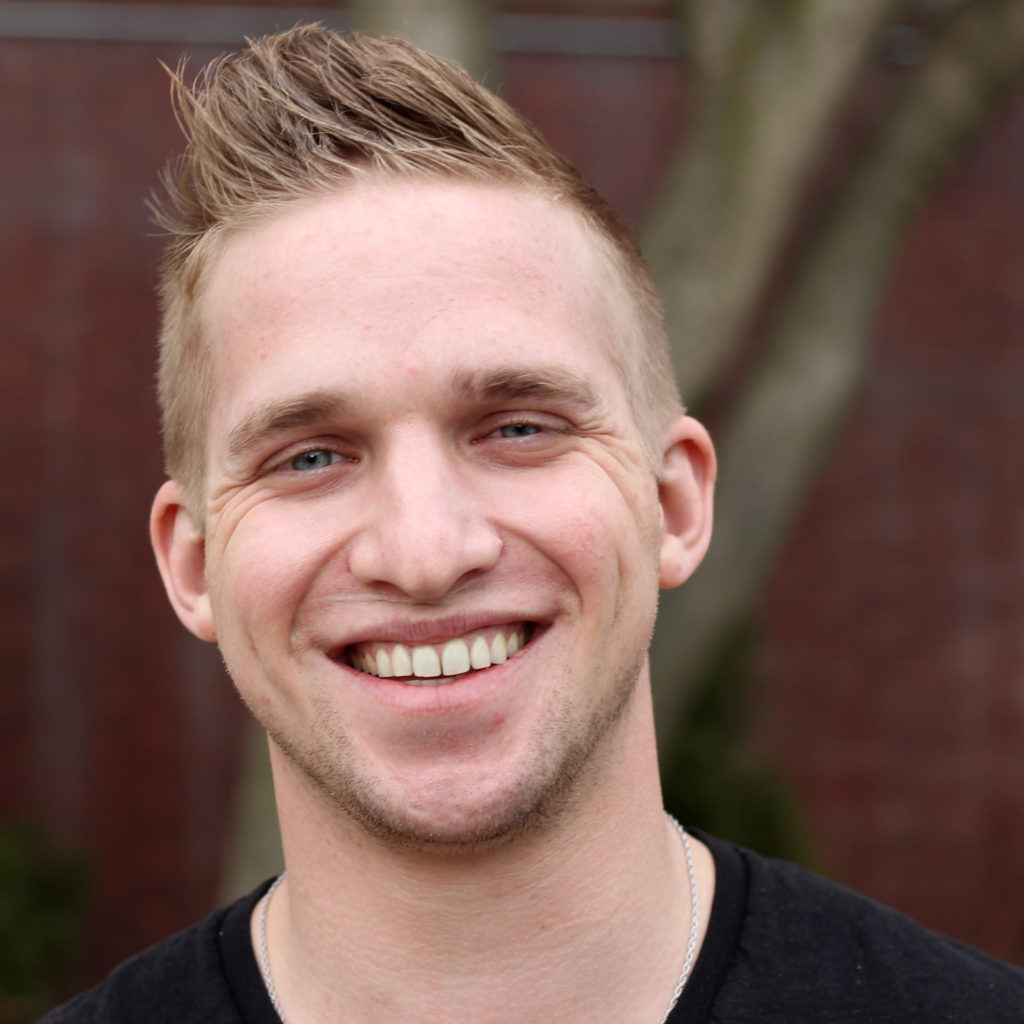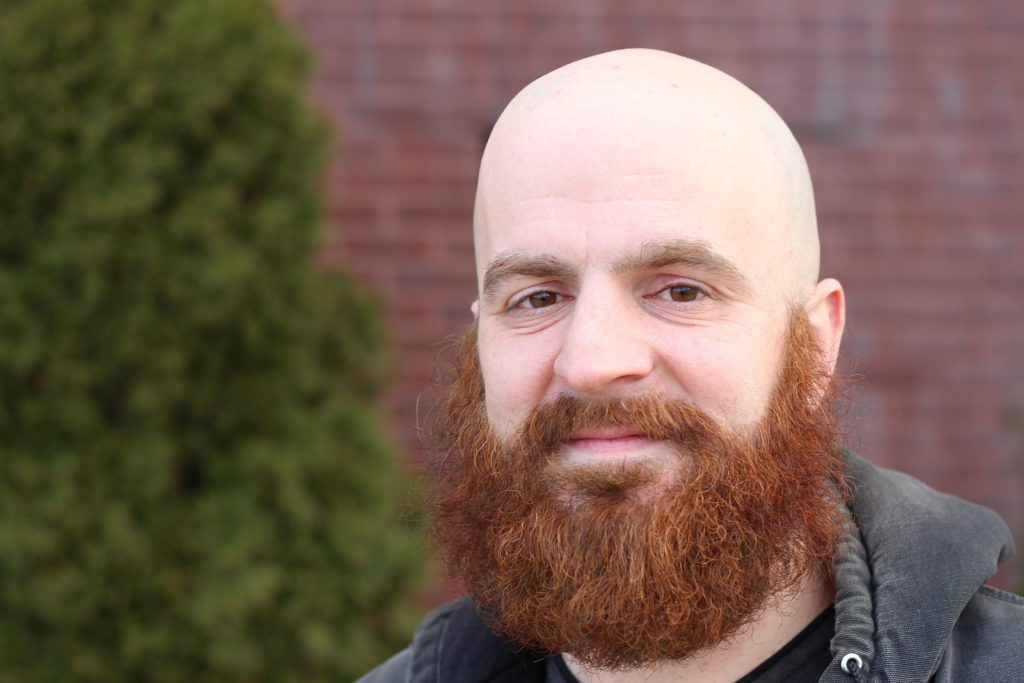Michael, age 69, was born and raised in
a small rural farming town of West Grove,
Pennsylvania. The youngest of five children,
Michael learned to be invisible. “My dad was
a heavy disciplinarian,” recalls Michael. “We
were very well behaved, scared actually. My
mother was emotionally distant. I spent all my
time alone in music, electronics, and books. In
second grade my teacher wrote my parents to
tell them that I just stare out of the window.
She thought that I was not paying attention,
when really, I was somewhere else.”
“I had my first drink at age 11. I would go
downstairs after one of my parent’s pinochle
games and drink any leftover beverages. I
never got a buzz. In high school, I started
smoking weed, taking speed, and dropping
acid. All my friends were into music, and we
would sit around, get high, and play. As soon
as I graduated from high school, I moved out.
At the time, I thought the trauma from my
parents was normal for everybody. I had no
idea that the abuse was not normal!”
“When I went to technical school for my
associates degree, I started working with bands
as a sound engineer. I was good at it. When
you are working with a rock and roll band, you
are at a club or bar every night. I drank, but
never to excess. I had a job to do.”
“My brother Joe did three tours of Vietnam.
He came back from the war a changed man,
but we became close again. 23 months later,
he committed suicide. My dad called me up
and told me to get my brother. I went into
the woods, found his body, and it destroyed
me. It took me 10 years in and out of mental
institutions to be able to function properly.
During one of my stays, a fellow patient was
given a lobotomy. They wheeled him into my
room with his eyes wide open and nothing
going on in his head. The orderly told me ‘if
you do not straighten up, this is how you are
going to end up.’ “
“My sister Jane had diabetes since she was eight,
and eventually would need a kidney transplant.
We made a pact, that when she was ready, I
would donate my kidney to her. One day
she called me and said, ‘Michael it is time to
come home.’ The first thing my mother said
to me was, ‘You can’t give her a kidney. You
do drugs!’ My sister was so mad at our parents
for trying to run her life, that she overdosed
on insulin the night before her transplant. 12
years after my brother Joe killed himself.”
“Eventually, I met a lady named Carol in
1983, and we were married for 22 years.
We started drinking excessively, but I
was a functional drunk. We began using
methamphetamines, which we would use
for the next 20 years. Eventually we got
busted. The cops came in, stuck seven
guns in my face, and off we went to jail.”
“By 2001, all that I wanted to do was lay
around and stay high. In 2005, Carol could
not take it anymore and told me that I
had to leave. I tried to commit suicide
two times. I do not know how I survived
even one of the attempts but ended
up at a hospital where they gave me a
dual diagnosis of drug abuse and bipolar
disorder. Shortly after my diagnosis, I
ended up at Water Street Rescue Mission
in Lancaster, Pa., where I began my
relationship with Jesus.”
“In 2017, I got pneumoococcal pneumonia.
It took a year for me to function again. I
could not work anymore and retired at age
65. To “change places,” I moved away and
abandoned my recovery network. I started
using meth and drinking again. And
then Covid happened. I started drinking
daily. I was not drinking to get high; I was
drinking for oblivion. After 3 years of this
lifestyle, and three black out trips to the
hospital in Elkton, Md, I finally heard about
Helping Up Mission (HUM). My nurse
gave me a number for Jason at Maryland
State Health. Jason told me about HUM,
picked me up, drove me to Baltimore, and
dropped me off.”
“At first, I was scared and not thinking
clearly but, everybody was so nice and
helpful. I was so angry and irritable that the
other clients called me ‘grumpy old man!’
By the third week, I knew HUM was where
I was supposed to be. There is a feeling
here that you know you are safe. I got out
of my comfort zone and joined the choir.
One day I was talking to the Treatment
Intern about the Bible, and he asked me
why I was here. I opened up about my
trauma from my dysfunctional family and
the deaths of my siblings. Soon, I was
talking to my Treatment Coordinator Todd
Starkey, and he helped me forgive them.“
“Really talking about my trauma made me
aware of other traumas in my life. HUM
offered a spiritual healing trauma class
which was helpful. I then read a manual
on trauma that was just neurological.
Soon, I was mentally able to absorb both
the therapist’s and survivor’s viewpoints. I
have been working on trauma a lot in the
past six months and just for myself, I took
HUM’s trauma class again.”
“I would like to thank the donors sincerely.
Without your support, this beautiful place
could not happen. You are changing
people’s lives.”
“To the guys like me who need help – If you
are not familiar with the Bible, and you
do not know much about Jesus, I would
look into it. The Bible has strengthened my
relationship with God.”

